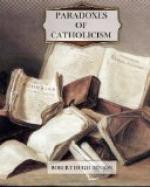Oh! these New Theologies that see in Christ’s Death merely the end of His Life! Why, it is the very point and climax of His Life that He should lay it down! Like Samson himself, that strange prototype of the Strong Man armed, he slew more of the enemies of our souls by His Death than by all His gracious Life. For this cause He came into the world. For Sacrifice, which is the very heart of man’s instinctive worship of God, was set there, imperishably, in order to witness to and be ratified by His One Offering which alone could truly take away sins; and to deny it or to obscure it is to deny or to obscure the whole history of the human race, from the Death of Abel to the Death of Christ, to deny or obscure the significance of every lamb that bled in the Temple and of every wine-offering poured out before the Holy Place, to deny or to obscure (if we will but penetrate to the roots of things) the free will of Man and the Love of God. If Christ had not died, our faith would be vain.
II. Once again, then, let us turn to the event in our own lives that closes them; that death which, united to Christ’s, is our entrance into liberty and, disunited, the supreme horror of existence.
(1) For without Christ death is a violent interruption to life, introducing us to a new existence of which we know nothing, or to no existence at all. Without Christ, however great our hopes, it is abrupt, appalling, stunning, and shattering. It is this at the best, and, at the worst, it is peaceful only as the death of a beast is peaceful.
(2) Yet, with Christ, it is harmonious and continuous with all that has gone before, since it is the final movement of a life that is already dead with Christ, the last stage of a process of mortality, and the stage that ends its pain. It is just one more passing phase, by which is changed the key of that music that every holy life makes always before God.
There is, then, the choice. We may, if we will, die fighting to the end a force that must conquer us however we may fight, resisting the irresistible. Or we may die, in lethargic resignation, as dogs die, without hopes or regrets, since the past, without Christ, is as meaningless as the future. Or we may die, like Christ, and with Him, yielding up a spirit that came from the Father back again into His Fatherly hands, content that He Who brought us into the world should receive us when we go out again, confident that, as the thread of His purpose is plain in earthly life, it shall shine yet more plainly in the life beyond.
One last look, then, at Jesus shows us the lines smoothed from His face and the agony washed from His eyes. May our souls and the souls of all the faithful departed, through His Mercy, rest in Him!
XI
LIFE AND DEATH
As dying, and behold we live.—II COR. VI. 9.




